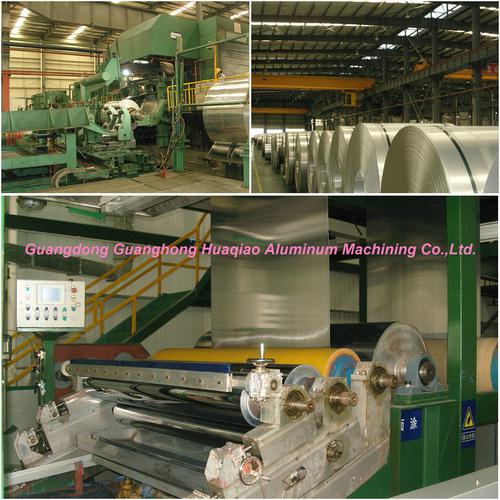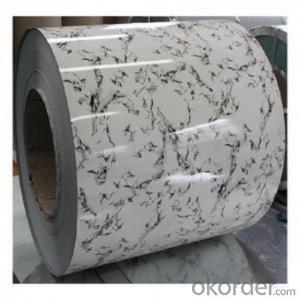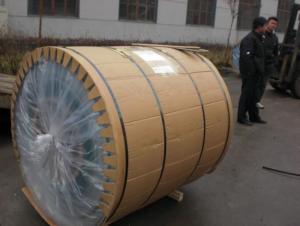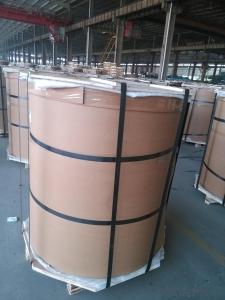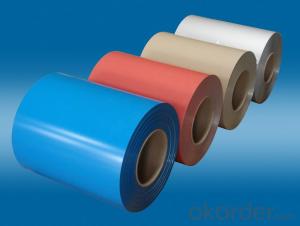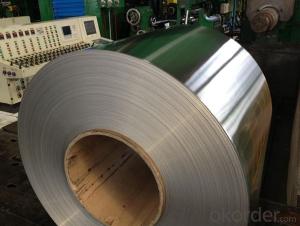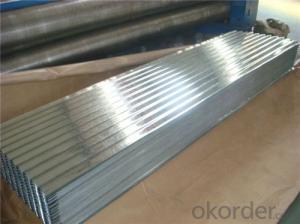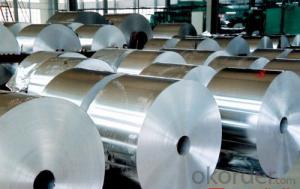Cold Casting Aluminum Mill Finish Rolls for Roofing Sheet Coils
- Loading Port:
- China Main Port
- Payment Terms:
- TT OR LC
- Min Order Qty:
- -
- Supply Capability:
- -
OKorder Service Pledge
OKorder Financial Service
You Might Also Like
Cans cover (ring) pre-coated plates
First, the raw materials
Aluminum lid and pull the main substrate of aluminum from the southwest andNanshan Aluminum, the use of aluminum-magnesium alloy 5182H19, 5052H19. Itsproducts in the normal substrates of manganese and magnesium components addedto increase the tensile strength and elongation. Han and the lotion by theGerman food-grade chrome HD agent, the United States PPG epoxy phenolicpackaging coatings, and high-end DOS oil
Second, applications
Division I professional production of DOS card and aluminum cans with a coatingfor cans of the lid and pull the coated aluminum is widely used in beverage,beer, rice pudding, tea, cigarettes, cans and other products packaging. U.S.imports of food ash using electrostatic spray wax, cut by large waves, transverseshear, longitudinal easily processed into the system covered the pre-coatedaluminum manufacturers. Depending on the system covers equipment can makeweight and volume of different specifications to meet customer requirements.
Third, the application prospect
Cans of food packaging as lightweight, unbreakable, easy to carry transportcharacteristics, cans packaged foods will gradually replace the glass packagingfood. As
Alloy & specification
Alloya | Coated panel,strip status | Status | Aluminum thicknessa t/mm | Aluminum Specificationa /mm | Aluminum coil specificationa /mm | ||
Width | length | width | Steeve Φ | ||||
5052、5182 | H46、H48、H49 | H18、H19、 H36、H38、H39 | 0.22≤t≤0.50 | 500~1600 | 500~4000 | 20~1600 | 300、350、 405、505 |
a.Other alloy, specification of material can be negotiated | |||||||
Aluminum thickness
Aluminum thickness | Thickness tolerance(±) |
>0.22~0.30 | 0.005 |
>0.30~0.50 | 0.008 |
Width and Length
Alloy | Aluminum panel&coil length tolerance/mm | Aluminum Panel & coil width tolerance/mm /mm | ||||
Pop top | Pop can cover | |||||
Length≤2000 | Length >2000 | width≤100 | width >100 | width≤1000 | width >1000 | |
5052 5182 | +1 0 | +2 0 | ±0.2
| +1.5 0 | +1.0 0 | +1.5 0 |
Dynamic features
Alloy | Status | thickness(t)/mm | Room temperature tensile test results | ||
Tensile strength Rm/MPa | non-proportional extension strengthRp0.2/MPa | elongationA50mm /% | |||
≥ | |||||
5052 | H36 | >0.22~0.30 | 255~305 | 200 | 2 |
>0.30~0.50 | 255~305 | 200 | 3 | ||
H18、H38 | >0.22~0.30 | 270 | 210 | 2 | |
>0.30~0.50 | 270 | 210 | 3 | ||
H19、H39 | >0.22~0.30 | 290 | 220 | 2 | |
>0.30~0.50 | 290 | 220 | 3 | ||
5182 | H36 | >0.22~0.30 | 265~340 | 270 | 3 |
>0.30~0.50 | 265~340 | 270 | 4 | ||
H18、H38 | >0.22~0.30 | 330 | 285 | 3 | |
>0.30~0.50 | 330 | 285 | 4 | ||
H19、H39 | >0.22~0.30 | 340 | 295 | 3 | |
>0.30~0.50 | 340 | 295 | 4 | ||
Coating function
Suppliershould ensure DOS oil of pop can cover is up to 5~10mg/m2/side, and coating surfaceshould be with even wax which is up to 40~100mg/m3/side
Food and packing industry pop can covercoating aluminum panels’ features:
Function | Coating weightg/m2 | Deviation of coating | T Bend | MEK | High temperature sterilization | S Resist-ance | Acid resista-nce | Adhe -sion | |
Pop can Cover | Outer coating | 3~6 | ≤10 | ≤2 | >50 | See Note.1 | - | - | 1 Grade |
Inner coating | 10~13 | ≤10 | ≤2 | - | See Note.1 | See Note.2 | See Note3 | 1 Grade | |
Pop can tab | 2 sides coating | 3~6 | ≤10 | ≤2 | >50 | See Note.1 | - | - | 1 Grade |
Note: 1 After121℃,30min distill,Internal and external coating without white, loss of light, peeling, and shedding. 2 After121℃,30min S corrosion,Internal and external coating without white, loss of light, peeling, and shedding. 3 After121℃,30min acid erosion,Internal and external coating without white, loss of light, peeling, and shedding. | |||||||||
The surface of the pop cans cover coatingdoes not allow defects such as air bubbles, scratches, missing coating,over-burning, oil spots, stains, streaks, color, piebald, roller printing,embossing, periodic prints, chemical liquid etc which impact users.
Each coil allowed a joint which does notallow loose layer or dislocation, the joint can only be overlapped, which needto make the mark in the end, and each batch coil of joint is not morethan 10% of the total number of coils.
Services
Supporting services: Offering semi-finishedproducts & OEM services
- Q: Are there any limitations on the coil flatness of aluminum coils?
- Aluminum coils, like other metal coils, have limitations on their flatness. The flatness of a coil refers to the extent to which its surface deviates from being completely flat. The American Society for Testing and Materials (ASTM) has set standards for measuring and evaluating the flatness of metal coils, including aluminum coils. These standards provide guidance for manufacturers, suppliers, and customers in determining the acceptable level of flatness for a particular application. The acceptable flatness of aluminum coils can vary depending on factors such as coil thickness, aluminum grade, and intended use. Thinner coils generally have stricter flatness requirements than thicker ones due to their greater susceptibility to distortion and waviness. Coil manufacturers employ various techniques, such as tension leveling, roller leveling, and corrective leveling, to control and improve flatness. These processes help to minimize or eliminate any deviations in flatness that may occur during coil manufacturing or processing. It is important to understand that achieving perfect flatness in aluminum coils is not always possible due to the inherent properties of the metal. Aluminum tends to exhibit some degree of natural springback, which can result in slight variations in flatness. However, these variations typically fall within acceptable tolerances for most applications. Ultimately, the limitations on the flatness of aluminum coils depend on the specific requirements of the customer or industry. Effective communication and clear establishment of flatness specifications between manufacturers and suppliers are crucial to ensuring that the coils meet the desired quality standards.
- Q: Are the currently rentable U-Haul trailers or trucks made out of aluminum or fiberglass? Thanks!
- most of them are aluminum
- Q: Is it possible to use aluminum coils for decorative purposes in a garden setting?
- <p>Yes, aluminum coils can be used for decoration in the garden. They are lightweight, durable, and resistant to corrosion, making them suitable for outdoor use. You can form them into various shapes or use them to create unique garden structures such as trellises, sculptures, or even as part of a fence. Their metallic finish can add a modern or industrial touch to your garden's aesthetic, and they can be painted or left in their natural state to blend with different garden themes.</p>
- Q: How are aluminum coils protected against chemical exposure?
- Various methods are employed to safeguard aluminum coils from chemical exposure. One prevalent approach involves applying a protective coating or finish to the coil's surface. This coating serves as a barrier, shielding the aluminum from potentially harmful chemicals and preventing direct contact and corrosion. Another technique is anodization, whereby the aluminum surface is treated electrolytically to create a layer of oxide. This oxide layer not only provides excellent resistance against chemical exposure but also enhances the overall durability of the coils. Anodized aluminum coils find extensive use in industries like construction, automotive, and aerospace, where chemical resistance is of utmost importance. Additionally, aluminum coils can be safeguarded by employing specific alloys designed to withstand chemical corrosion. These alloys incorporate additional elements, such as copper or magnesium, which bolster the aluminum's resistance to chemical attack. By carefully selecting the appropriate alloy composition, manufacturers can ensure that the aluminum coils are better equipped to endure chemical exposure. In summary, protecting aluminum coils from chemical exposure necessitates a combination of protective coatings, anodization, and the use of corrosion-resistant alloys. These measures play a vital role in prolonging the lifespan of the coils and maintaining their performance even in harsh chemical environments.
- Q: Describe the steps involved in the production of aluminum coil.
- <p>The process of making aluminum coil involves several key steps. Initially, raw materials, typically bauxite ore, are mined and then refined to produce aluminum oxide. This aluminum oxide is then reduced to aluminum metal through the Hall-H茅roult process, where it is dissolved in molten cryolite and electrolyzed to extract aluminum. Once the aluminum is produced, it is melted and then continuously cast into large slabs or billets. These slabs are then hot or cold rolled to reduce their thickness and width, forming coils. The coils are annealed to improve their mechanical properties and surface finish. Finally, the aluminum coils are cleaned, inspected, and cut to size before being packaged and shipped to customers for various applications such as construction, automotive, and packaging.</p>
- Q: Can aluminum coils be used in food processing equipment?
- Yes, aluminum coils can be used in food processing equipment. Aluminum is a widely used material in the food industry due to its excellent heat conductivity, corrosion resistance, and lightweight properties. It is commonly used in food processing equipment such as refrigerators, ovens, and heat exchangers.
- Q: How are aluminum coils tested for quality assurance?
- Various methods and parameters are employed to test aluminum coils for quality assurance, ensuring their compliance with industry standards and customer requirements. One of the most common tests conducted on aluminum coils is dimensional inspection, which involves measuring and comparing the dimensions and tolerances of the coils with the specifications to ensure they are manufactured within the required size and shape. Mechanical properties of the aluminum coils are also evaluated as an important aspect of quality assurance testing. This includes tests like tensile strength, yield strength, elongation, and hardness, which determine the strength and durability of the coils, ensuring they can withstand intended applications and environments. Surface quality assessment of the aluminum coils involves visual inspection to identify any visual defects such as scratches, dents, or surface irregularities. Additionally, non-destructive testing methods like ultrasonic or eddy current testing are utilized to detect any hidden defects or flaws within the coils. Chemical analysis is conducted to determine the composition and purity of the aluminum coils, which is crucial to ensuring they meet required chemical composition standards as impurities can affect their performance and integrity. Corrosion resistance testing is also performed to evaluate the ability of the aluminum coils to withstand corrosion in different environments, especially when exposed to harsh conditions or corrosive substances. In summary, quality assurance testing for aluminum coils encompasses physical, mechanical, visual, and chemical evaluations. These tests are carried out at various stages of the manufacturing process to ensure the coils meet the highest quality standards and deliver reliable performance in their intended applications.
- Q: who discovered aluminum and in what year did they discover it?
- Aluminum was named for one its most important compounds, alum. Alum is a compound of potassium, aluminum, sulfur, and oxygen. The chemical name is potassium aluminum sulfate, KAl(SO4)2. No one is sure when alum was first used by humans. The ancient Greeks and Romans were familiar with the compound alum. It was mined in early Greece where it was sold to the Turks. The Turks used the compound to make a beautiful dye known as Turkey red. Records indicate that the Romans were using alum as early as the first century B.C. It was first ISOLATED in 1827 by German chemist Friedrich W?hler (1800-82). W?hler used a method perfected by English chemist Sir Humphrey Davy (1778-1829),
- Q: What is the minimum order quantity for aluminum coils?
- The minimum order quantity for aluminum coils can vary depending on the supplier and specific product requirements. Some suppliers may have a minimum order quantity of one coil, while others may require a minimum order quantity of several coils or even a full container load. It is best to contact the specific supplier or manufacturer to inquire about their minimum order quantity for aluminum coils as it can vary.
- Q: How are aluminum coils used in the manufacturing of signage?
- Due to their numerous advantageous properties, aluminum coils find extensive use in the production of signage. These coils are commonly crafted from high-quality aluminum alloy, which offers exceptional resistance to corrosion and durability, making them an ideal choice for outdoor applications. The initial step in utilizing aluminum coils for signage manufacturing involves the process of coil slitting. This process entails cutting the large aluminum coils into smaller, more manageable sizes that can be effortlessly shaped and formed to meet specific design requisites. By undergoing this slitting process, the coils are ensured to possess the appropriate width and thickness for the desired signage application. Once the coils are suitably sized, they are typically fed into a roll-forming machine. This machine enables the precise shaping of the aluminum coils into the desired signage profiles, such as flat panels, letters, or channel letters. The adaptability of aluminum permits the creation of intricate and personalized designs with ease. Aluminum provides great versatility when it comes to finishing options. The coils can be coated with various protective finishes, such as polyester or PVDF coatings, which bestow enhanced durability and resistance to fading, chipping, or peeling. Additionally, these finishes offer a broad spectrum of color choices, allowing signage manufacturers to fabricate visually captivating and vibrant displays. Furthermore, aluminum coils possess the advantage of being lightweight, thereby facilitating ease of handling during the fabrication process and reducing transportation costs. The lightweight nature of these coils also renders them suitable for mounting on diverse surfaces, including walls, poles, or freestanding structures. To summarize, aluminum coils play an indispensable role in the manufacturing of signage by providing a lightweight, versatile, corrosion-resistant, and durable material. Their ability to be effortlessly shaped and formed enables the creation of tailor-made designs, and their protective finishes guarantee signage displays that are long-lasting and visually striking.
Send your message to us
Cold Casting Aluminum Mill Finish Rolls for Roofing Sheet Coils
- Loading Port:
- China Main Port
- Payment Terms:
- TT OR LC
- Min Order Qty:
- -
- Supply Capability:
- -
OKorder Service Pledge
OKorder Financial Service
Similar products
Hot products
Hot Searches
Related keywords

